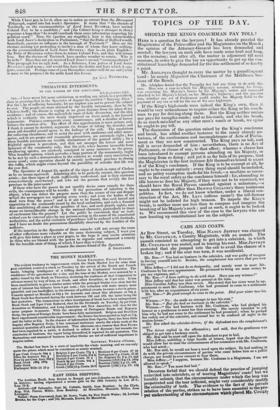? PREMATURE INTERMENTS.
" TO TI1E EDITOR OF THE SPECTATOR.
5th September 1832
Strt—I have never felt more satisfaction at reading any article in a periodical, than in perusing that in the Spectator of August 25, entitled " Burying Alive." For the s._ke of suffering humanity, let inc implore you not to permit the subject to rest. The people are more alarmed by the forcible interments, than by the Cholera itself; the disease is raging at no great distance from the place of my residence ; and of course, the melancholy topic of daily discussion, and the idea which is evidently the most deeply impressed on every mind, is the hurried Interments. Paleness overspreads every countenance, and a shudder of horror follows the mention of it. The effect of this apprehension is most serious, and, I think it cannot be doubted, augments the danger of taking the disorder, and must add dreadful mental agony to the feelings of the sick. The regulations for enforcing cleanliness, and to assist the poor with medicines and other necessaries, and to use proper and reasonable precautions, are extremely sight; but these forcible interments are terrible diminutions of the general utility for a frightful opinion is prevalent, and that not amongst the lowest and most ignorant of the community only, that the sick, when become insensible from swallowing opiates, are carelessly consigned in many instances to the grave. This dreadful opinion, which pervades a large portion of the community, ought to be met by such a demonstration to the contrary as would carry conviction to every mind ; some operation should be strictly performed, previous to closing the coffin, which might evince beyond the possibility of mistake that life was for ever fled.
The Spectator of August 25, speaks of the signs of death in cases of Cholera as by no means equivocal. Admitting this to be perfectly correct, this question arises—Are these signs of death sufficiently understood, and is their existence conscientiously ascertained; and who are the persons that ccrtefy the fact previous to the interments? If those who have the power do not speedily devise some remedy for these evils, the consequences will be terrific. If the prevention of infection is the object, what can defeat the purpose more than the scenes of riot and despair WIlich the newspapers are reporting every week ; and even the bodies of the dead torn from the grave? and is it not to be feared, that such hatred and opposition to the commands issued by the local authorities, and such a frenzied fear annihilating all sense of the penalties of law, and such ghastly sights, may cause no inconsiderable change in the national Character, particularly in times of excitement like the present ? Let the public be convinced, that no individual can be interred alive by any persons acting in the name of the constituted authorities, and the awful visitation of pestilence will be endured with fortitude, end I have no doubt due precautions thankfully observed by the families of the sufferers.
If the insertion in the Spectator of these remarks will not occupy the room of other reflections more valuable on the same distressing subject, I trust you will give this letter a place in your pages, in the hope it may excite attention in those who are blessed with the power to organize and command a remedy for the horrible state of things of which I have thus written. I remain the sincere friend of the Spectator, A SOLITAIRE.


























 Previous page
Previous page